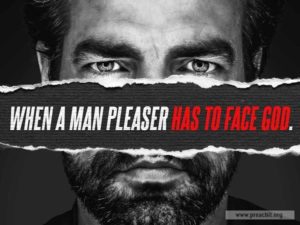“The fear of man brings a snare, But whoever trusts in the LORD shall be safe” (Prov. 29:25)
II. Faith In God is the Security You Seek
Notice the fear of man is laid parallel to trusting God. In other words – the fear of man is really faith in man and not God. Driven by selfishness and pride, we look to other men as opposed to God. But Scripture says, it is trust in God, a reverent faith in Him, that brings safety. Here we are, through our sin fearing that men will harm us, humiliate us, heckle us, and we worry, and fret, and scheme and plan to avoid that. But all along, Scripture says, the safety you are seeking lies in this relationship of truth and submission to God. How is that possible? The Bible gives you three ways that this kind of walk with God drives out the selfish fear of man.
1. First, faith enlarges God and shrinks men. Charles Spurgeon said, “The fear of God is the death of every other fear; like a mighty lion, it chases all other fears before it.” The fear of God is the sense of awe before a God who is both infinitely great and infinitely good. The tension and yet harmony of His greatness and goodness, His justice and mercy, His might and His gentleness, His wrath and His love, cause a submitted, obedient, admiration in those who are His. Now the greater our sense of this God, who has made us, redeemed us, and providentially watches over us, necessarily the smaller men must seem to us.
“I, even I, am He who comforts you. Who are you that you should be afraid Of a man who will die, And of the son of a man who  will be made like grass? And you forget the LORD your Maker, Who stretched out the heavens And laid the foundations of the earth” (Isa. 51:12-13). When we are deepening in our walk with God, taking in His Word, worshipping Him in private and in public, our understanding of Him should be growing. This text is saying, your god is too small, if man is your greatest concern. Jesus put it this way, when He said, “And do not fear those who kill the body but cannot kill the soul. But rather fear Him who is able to destroy both soul and body in hell” (Matt. 10:28).
will be made like grass? And you forget the LORD your Maker, Who stretched out the heavens And laid the foundations of the earth” (Isa. 51:12-13). When we are deepening in our walk with God, taking in His Word, worshipping Him in private and in public, our understanding of Him should be growing. This text is saying, your god is too small, if man is your greatest concern. Jesus put it this way, when He said, “And do not fear those who kill the body but cannot kill the soul. But rather fear Him who is able to destroy both soul and body in hell” (Matt. 10:28).
Invariably, the person in the grip of the fear of man has a diminished view of God. Instead of seeing God as the Judge, they give the opinions of others more weight. Instead of seeing God as the One who atones for sins, they fret about covering their own sins from others. Instead of seeing God as the one whose approval counts, they try to gain the applause of fickle men. Instead of seeing God as the one who beautifies us with the robes of righteousness, they try to do and say the things that will make people admire.
But to the Christian growing in the knowledge of God, he can say, “So what if this person seeks to shame me. My sins are covered in Christ. His name is now mine. My reputation died with Christ. The one who will defend me is the Advocate Christ Jesus.” “So what if this person will reject me, or disapprove of me, or ridicule me. God had made a verdict on my life, being in Christ, I am accepted in the beloved. His righteousness is mine, and I long for Him to say, Well done, you good and faithful servant.” “So what if man seeks to harm me. My body is the Temple of the Holy Spirit. God will only allow that which will conform me to the image of Christ, and in the end, whatever happens to me in this body, I am eternally safe in Christ.”
There is nothing more practical than deepening your theology. Go deep in the things of God, make progress in the knowledge of God, study the person and works of God, and watch how people begin to shrink in comparison. Job was upset that he had lost his reputation, and people now scorned him, and his so-called friends accused him of evil. But once God revealed Himself to  Job,all that faded away. Job said, “I have heard of You by the hearing of the ear, But now my eye sees You” (Job 42:5).
Job,all that faded away. Job said, “I have heard of You by the hearing of the ear, But now my eye sees You” (Job 42:5).
2. Second, a life of faith in God produces self-forgetfulness. When our eyes are on God, they cannot simultaneously be on man. “How can you believe, who receive honor from one another, and do not seek the honor that comes from the only God?” (Joh 5:44). Faith is antithetical to living for man’s honour. A.W. Tozer writes in The Pursuit of God: “Faith is the least self-regarding of the virtues. It is by its very nature scarcely conscious of itself. Like the eye which sees everything in front of it and never sees itself, faith is occupied with the Object upon which it rests and pays no attention to itself at all. While we are looking at God we do not see ourselves – blessed riddance!” The great joy of faith is not that it affirms self, it is that it frees us from thinking about self altogether. What a bondage, to be consumed with appearance, with reputation, with putting the right foot forward at all times. What a hard life, to always protect self against all threats, dangers, attacks. How wearisome to be ever on your guard against slights, insults, being short-changed, outdone, overlooked, ignored, misrepresented. What a freedom in being outward, in being God-focused, and a genuine servant of others. C.S. Lewis put it this way: “Christ will indeed give you a real personality: but you must not go to Him for the sake of that. As long as your own personality is what you are bothering about you are not going to Him at all. The very first step is to try to forget about the self altogether. Your real, new self (which is Christ’s and also yours, and yours just because it is His) will not come as long as you are looking for it. It will come when you are looking for Him. Does that sound strange? The same principle holds, you know, for more everyday matters. Even in social life, you will never make a good impression on other people until you stop thinking about what sort of impression you are making. Even in literature and art, no man who bothers about originality will ever be original: whereas if you simply try to tell the truth (without caring twopence how often it has been told before) you will, nine times out of ten, become original without ever having noticed it. The principle runs through all life from top to bottom. Give up yourself, and you will find your real self. Lose your life and you will save it.”
3. Third, a life of faith in God grants courage to face danger. There is no doubt that Scripture equates faith with courage. Courage is not the absense of fear. Courage is choosing to face a fear because of something more important, a greater reality. Every time God said to His people, fear not, He coupled that command with a promise. Whether it was facing enemies, or appearing before a king, or undertaking a mission, or speaking to those who would persecute them, God said, trust in Me, and obey. There is a real danger, there is a threat, but I want you to face it, with My promises. Now it is true that some fears are simply self-imposed.
We can create threats in our minds at 2am in the morning. We can brood and worry, simply because we want a level of control and certainty in our lives which is idolatrous. Pride and selfishness can demand knowledge of the future, demand control over all possible threats, and thinks that by thinking it will eliminate them. It won’t. And often, in such a mind, fears multiply But having said that, there are real threats in this world. There is a real spiritual battle going on with real and dangerous foes. The world is full of evil people. We live in tumultuous times. Uncertainty and instability abounds. Christianity is increasingly frowned upon.
And when we are surrounded with real threats, what we need is courage. We acknowledge that the danger is real, but we do not allow the danger to master us. Whether it be the danger of a child disliking you because you discipline her, or the fear of a church member taking revenge because you expose his sin – it takes courage. The fear of evangelising in a pluralistic world, the fear of travelling at night to see someone needy in the hospital, the fear of teaching others lest your weaknesses be highlighted, the fear of people’s response to you if you go into ministry or missions – these can only be countered with courage.
The life of faith is a life of courage. So much so, that the Bible says this about cowards: “He who overcomes shall inherit all things
and I will be his God and he shall be My son. But the cowardly, unbelieving, abominable, murderers, sexually immoral, sorcerers, idolaters, and all liars shall have their part in the lake which burns with fire and brimstone, which is the second death”(Rev. 21:7-8). God is compassionate on our timidity. But those who choose to reject Christ, and so do not live by faith at all, will be numbered among the cowardly. We are looking for safety for ourselves when we fear man. But that’s the first problem – we focus on self, and elevate our own importance above God’s glory.
The second problem is where we look for that safety – man. “Thus says the LORD: ‘Cursed is the man who trusts in man And makes flesh his strength, Whose heart departs from the LORD'” (Jer. 17:5). Once we go down that path, we find ourselves trapped in a bondage of man’s opinions and man’s actions that stifles the very joy of life. The answer is not found in self-esteem. It is not found in despising your neighbour. It is found in a life of growing faith in God – knowing and loving him. As the knowledge of Him magnifies, it puts man in perspective. As our eyes are on Him, we are relieved from forever keeping vigil over our own image. And as we live a life of faith, we can courageously face those legitimate dangers,
without being ensnared by fear of man.
 – David De Bruyn, Professor of Church History, Shepherds’ Seminary Africa
– David De Bruyn, Professor of Church History, Shepherds’ Seminary Africa


